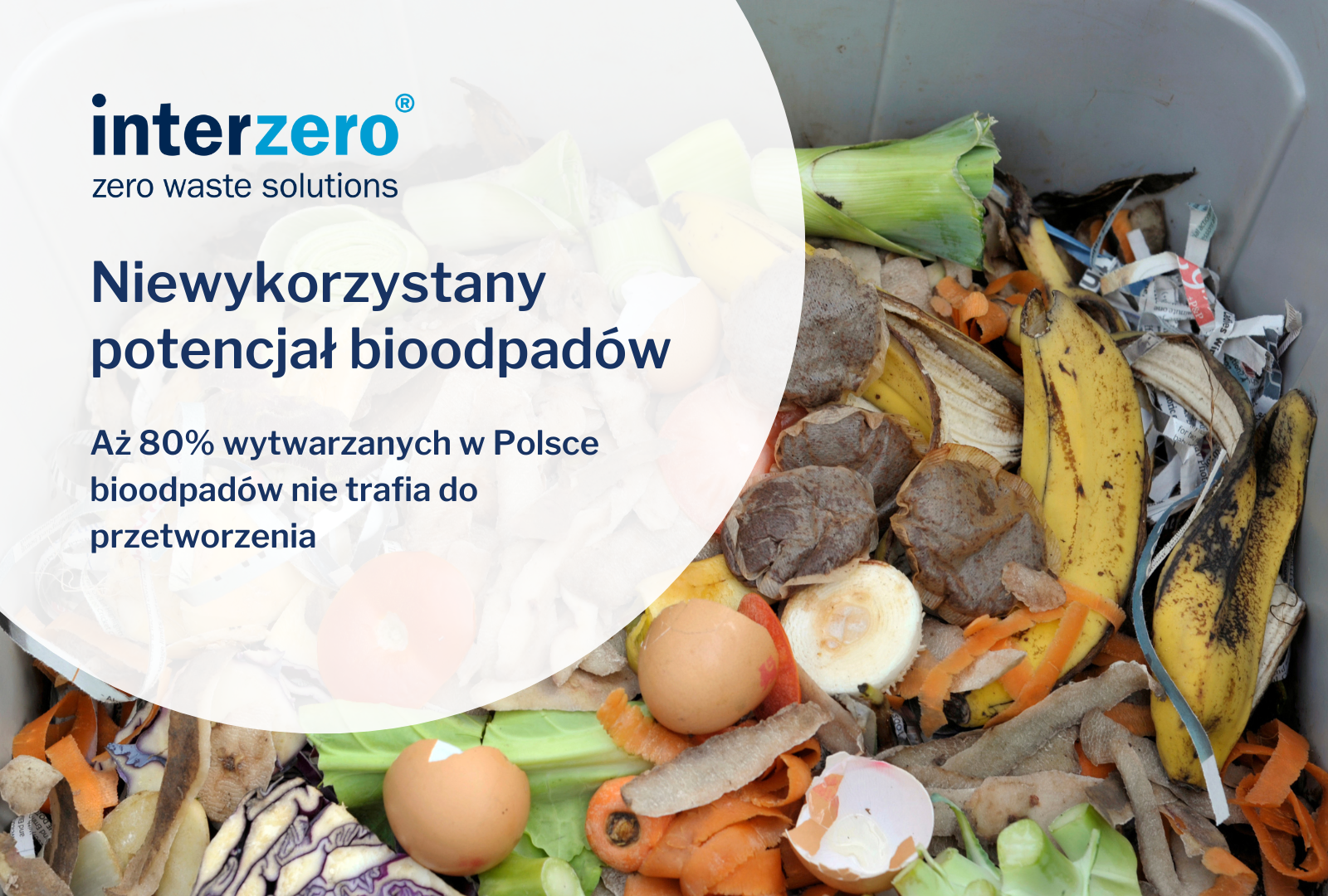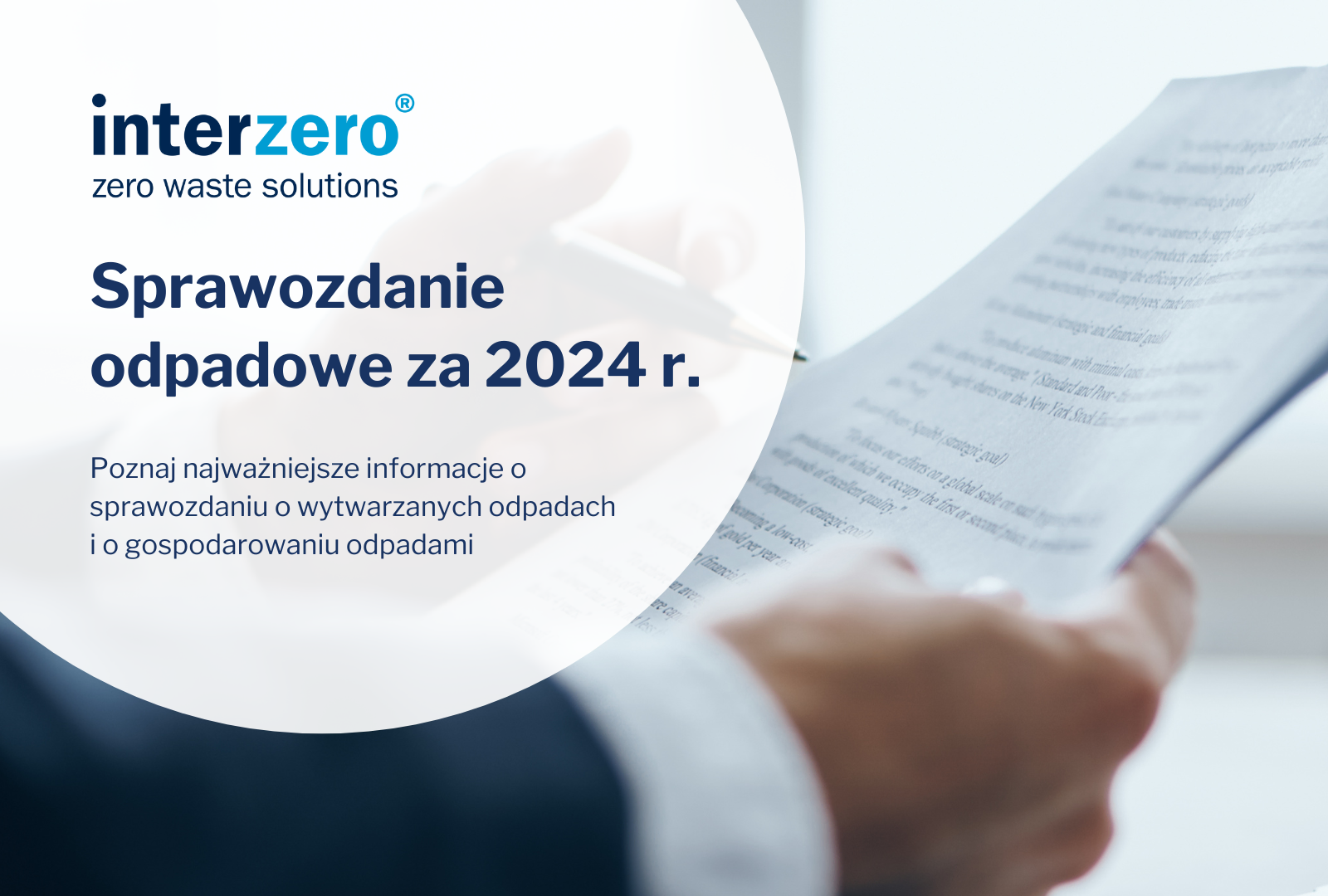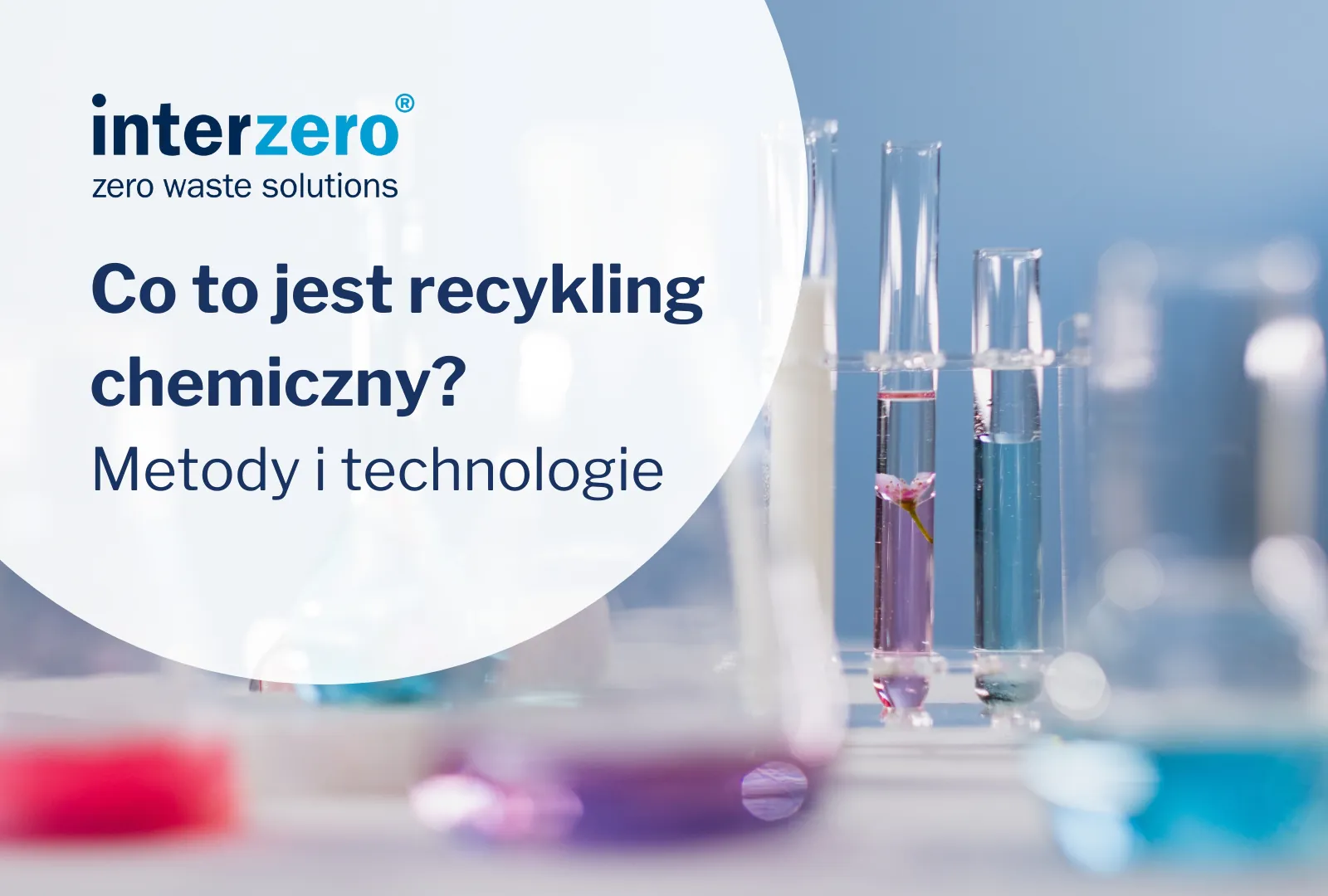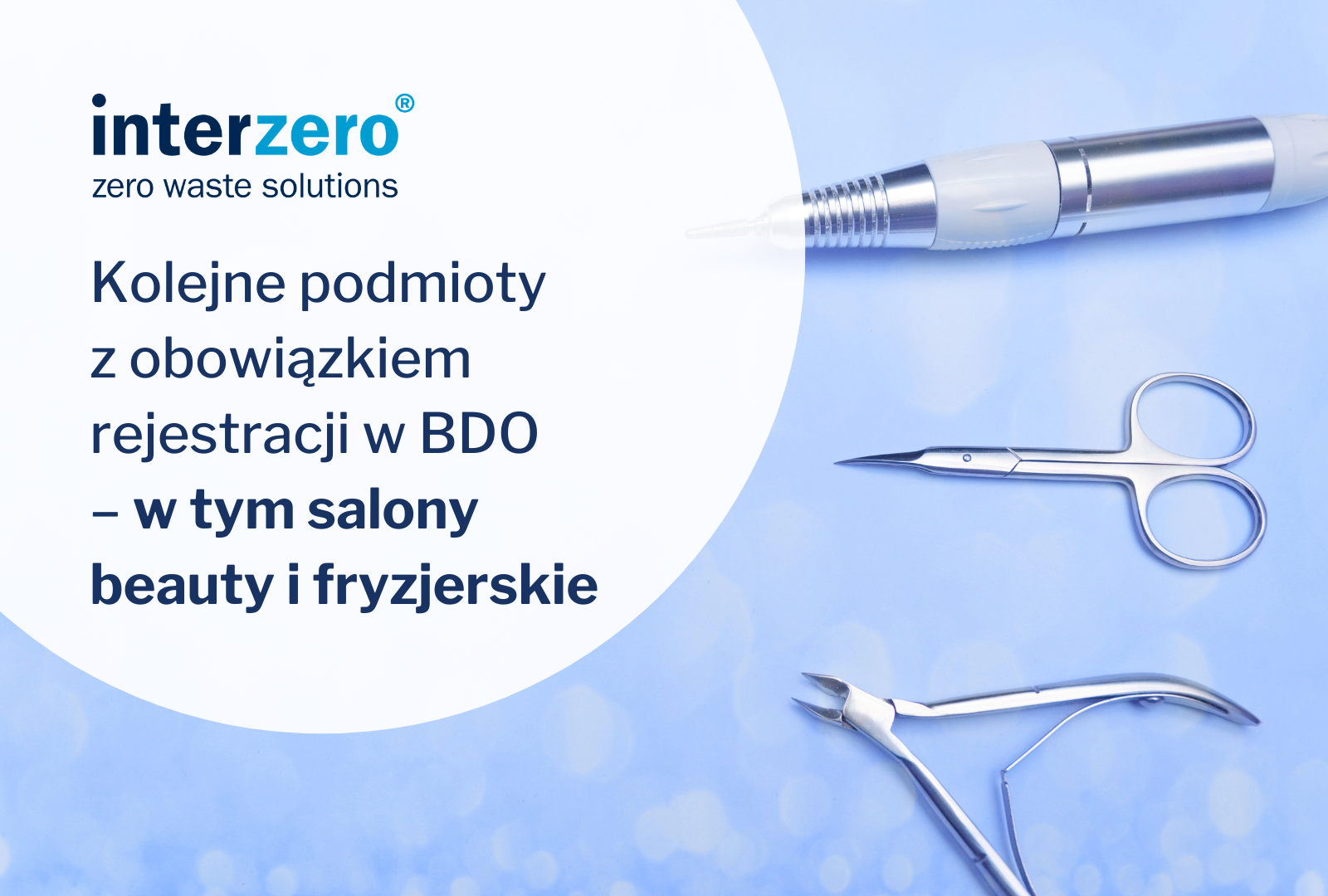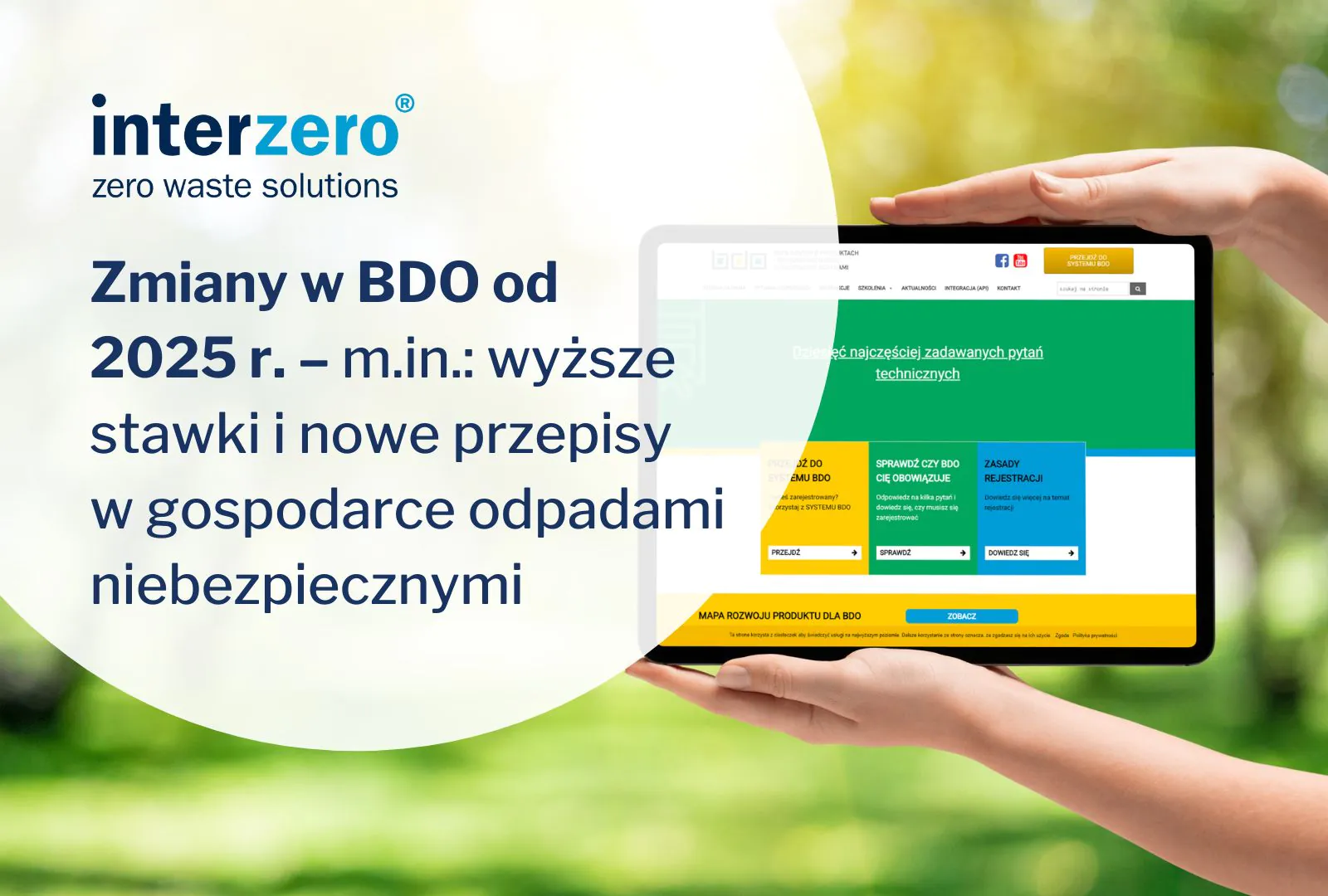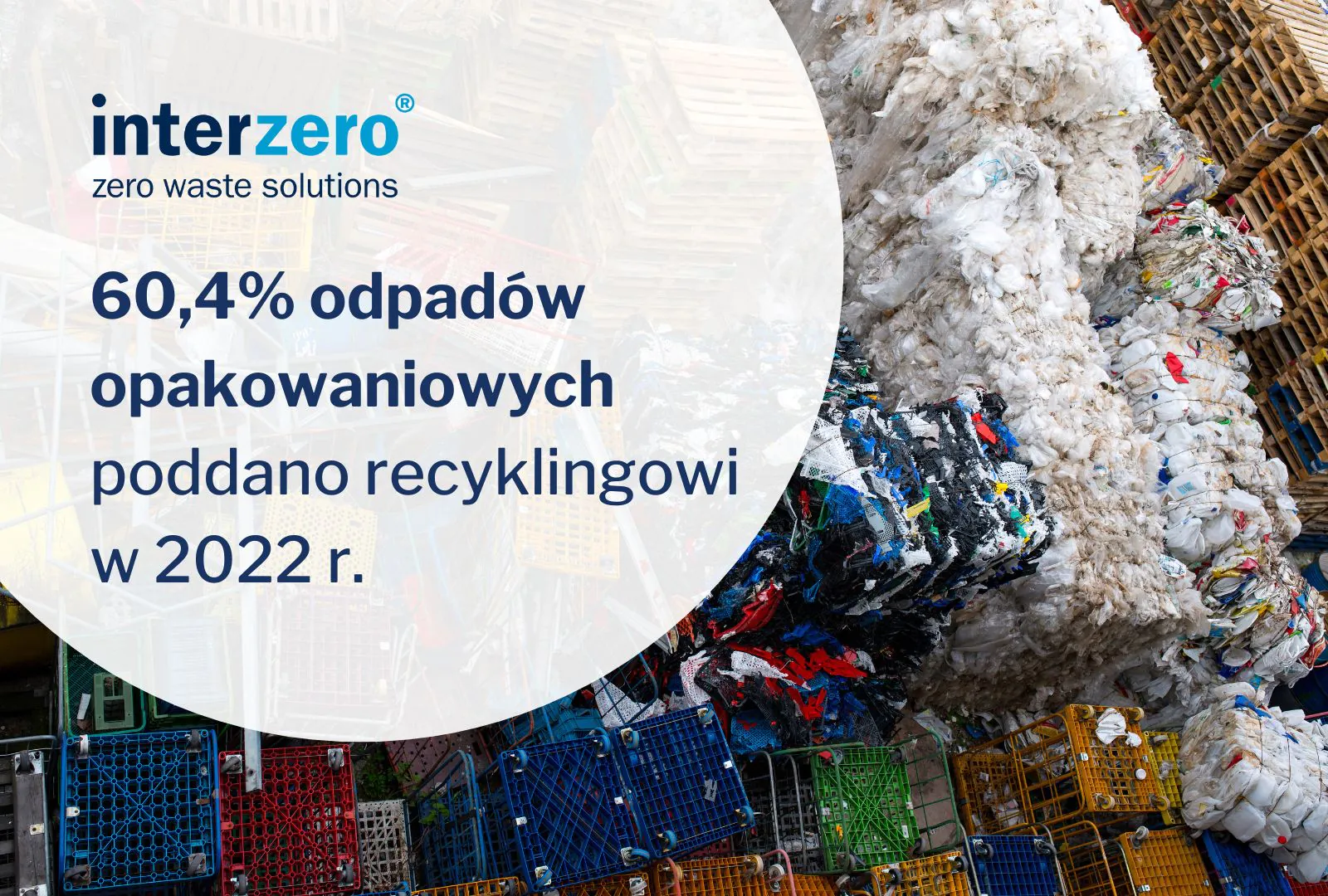Bio-waste collection needs to be improved: we only segregate 20% of the bio fraction
Bio-waste was supposed to be a source of ecological fertilizer and clean energy, and its processing was supposed to be a remedy for the growing minimum levels of recycling municipal waste. However, the reality turned out to be far from expectations - the bio-waste collection system is not fully effective, and the potential of this fraction is usually wasted in landfills.
Only 20% of all bio-waste is collected selectively
Currently, in Poland and across the EU , we process only a small percentage of the bio-waste we produce . This applies to both industrial and municipal waste. The Zero Waste and Bio-based Industries Consortium (BIC) report Bio-waste generation in the EU: Current capture levels and future potential estimates that each Pole can potentially generate 247 kg of bio-waste . This sum consists of:
- 112 kg of food waste,
- 135 kg of green waste.
Theoretical potential calculations were made based on a collection of public reports and national data.
However, according to the data provided by the Central Statistical Office, only 52 kg of bio-waste is selectively collected . Where does this difference come from? It most likely results from incorrect segregation of bio-waste - instead of the organic fraction, it ends up in mixed waste.
According to the calculations of the report's authors, in Poland only the following are selectively collected:
- 9% food waste,
- 20% of all bio-waste (food + green waste).
The average for EU countries is 24.9% for food waste and 30% for the entire bio-waste fraction.
As the authors of the report conclude:
The implementation of food waste collection strategies and practices will be one of the main factors increasing the overall recycling rate of bio-waste in the near future.
The untapped potential of food and catering waste
The aforementioned report by Zero Waste and the Bio-based Industries Consortium (BIC) indicates that as much as 75% of food waste generated in the EU remains unmanaged . This results in the loss of valuable resources that could be processed into natural fertiliser and alternative fuel, as well as excessive methane emissions that occur in landfills. In order to combat waste , Polish entrepreneurs operating in the catering industry and beyond are required to conclude an agreement for the collection and management of food waste they produce . This agreement can be concluded with a municipal company or with a specialised waste collection company, such as Interzero.
Cooperation with Interzero in the field of food waste collection from companies and institutions is a guarantee of its proper management. The catering waste we collect is transferred to specialized processing plants - composting plants and biogas plants, where it is subjected to composting and fermentation processes. Professional collection of food waste is one of the best ways to implement the idea of a closed-loop economy and to avoid legal consequences associated with improper management of bio-waste.
Industrial composters for food and catering waste
Food waste generated in companies can also be managed at source where it is produced. For this purpose, Interzero offers a range of electric composters for industrial use . They enable waste volume to be reduced by up to 90% and transformed into an excellent, nutrient-rich substrate (pre-compost) that can be used as a soil improver, biomass fuel or anaerobic fermentation raw material. The entire process takes just 24 hours and, thanks to the deodorisation system, is free from unpleasant odours .
The Oklin composter range also includes a device for home use. The Oklin GG-02 compact electric composter can be placed in the kitchen or pantry, providing a more convenient and faster alternative to composting kitchen waste in traditional composters.
Tightening municipal bio-waste collection as a chance to meet strict recycling targets
Bio-waste generated in households that is not managed at source must be selectively collected and then taken away by municipalities. However, the current collection systems are not perfect. In order to make it easier for municipalities to carry out tasks related to the effective collection and subsequent management of bio-waste, IOŚ-PIB has developed a Catalog of Good Practices in the Collection of Bio-Waste , which presents examples of efficient systems for managing biodegradable waste in Poland and Europe.
According to the report of the European Environment Agency, bio-waste constitutes approx. 34% of the stream of all municipal waste produced in the European Union. In Poland, this percentage was 37.4% in 2023. Considering the fact that from 2025 municipalities will have to achieve the 55% level of municipal waste recycling required by EU regulations, it will be necessary to focus on recycling bio-waste as the largest fraction . Is it possible? We talked about the problems and challenges of bio-waste management with Jan Kolbusz, Chief Technologist and President of Mikrobiotech in the Eko Bez Kantów podcast Clean Energy and Fertile Soil: How to Unlock the Potential of Bio-Waste?
Sources:
- https://biconsortium.eu/publication/bio-waste-generation-eu-current-capture-levels-and-future-potential-0
- https://stat.gov.pl/obszary-tematyczne/srodowisko-energia/srodowisko/ochrona-srodowiska-2024,1,25.html
- https://magazynbiomasa.pl/bioodpady-komunalne-jaki-to-potencjal-sprawdz-koniecznie/
BDO Annual Waste Report for 2024 - what do you need to know about the report on waste generated and waste management?
The beginning of the year also marks the beginning of the reporting period, in which entrepreneurs registered with BDO and keeping waste records must submit reports for 2024. Below we have collected the most important information and answers to the most frequently asked questions about BDO waste reports.
By when is the BDO waste report for 2024 submitted?
The annual report on waste generation and waste management must be submitted by 15 March for the previous calendar year. However, the deadline for submitting BDO reports for 2024 is 17 March 2025. Why March 17 and not March 15? In 2025 March 15 falls on a Saturday, therefore, by operation of law, the deadline for submitting the BDO report is postponed to the next business day, i.e. Monday, March 17.
This of course applies to entrepreneurs who continue to operate. Entrepreneurs who close their company are required to submit a report within 7 days of closing their business.
Who should submit the BDO annual waste report for 2024?
The annual BDO report, technically known as the annual report on waste generation and waste management, for 2024 is required to be submitted by all entities that :
- in 2024 they were subject to the obligation to keep waste records in the BDO (produced or managed waste),
- in 2024, as part of their activities, extracted waste from a landfill or waste dump on the basis of a consent to extract waste or a decision approving the instructions for running a waste landfill in the post-operational phase.
We would like to remind you that the obligation to submit an annual report also applies to entities keeping simplified waste records in BDO!
Don't have a BDO number? Check if you are obliged to register with BDO!
Is it necessary to submit a zero BDO waste report for 2024?
Entities that did not produce or process waste in 2024 are not required to submit a zero report .
How to submit a BDO waste report for 2024?
An annual report on waste produced and waste management should be submitted to the voivodeship marshal appropriate for the place of production, collection or processing of waste . If you produce, process or collect waste in several voivodeships, you are obliged to submit reports to the voivodeship marshals in all voivodeships where you conduct this activity.
The report can be completed and submitted exclusively electronically , through an individual account in the BDO system. Each entrepreneur can do it on their own or entrust their duty to Interzero experts, gaining a guarantee of efficient, reliable and timely preparation and then submission of reports. Contact us and receive the best offer for taking over the BDO reporting obligation!
What should the BDO waste report for 2024 include?
Depending on the areas of activity of a given entity, the annual report on waste generation and waste management for 2024 may contain information on :
- mass and types of waste ,
- method of waste management (applies only to waste management entities),
- installations and devices used to process this waste, including technical data of machines and information on the functioning of installations and devices: number of working hours per day, dates and duration of failures or downtimes (applies only to entities processing waste),
- the amount of sulphates or chlorides in waste per Mg of titanium dioxide produced (applies to entities possessing or processing waste from titanium dioxide production processes),
- mass and types of food waste generated.
As a rule, yes. If you have not submitted a BDO report on time, you should do so immediately , without waiting for a possible inspection or summons from the office. Thanks to this, you have a chance to avoid a severe financial penalty. Interzero experts will help you settle all reporting arrears. Contact us and present your situation, and we will help you identify all outstanding obligations and complete the necessary formalities.
Remember that your company's reporting obligations expire after 5 years! This means that the office may call you to submit a report for up to 5 years back, and additionally impose a fine of up to PLN 5,000 on your company.
What is chemical recycling?
What is chemical recycling?
Chemical recycling, also known as raw material recycling, is a waste processing method that uses high temperature or chemical agents. Experts see it as a chance to manage contaminated and heterogeneous fractions that cannot be recovered using mechanical recycling methods.
Chemical recycling will allow the recovery of raw materials from contaminated waste fractions
Raw material recycling involves thermal decomposition of waste, which can yield liquid hydrocarbons or gases that are components for the production of new raw materials. It is used to process some plastics (e.g. PET, polyethylene, polypropylene). This type of recycling is more energy-intensive and more expensive than material recycling , shoe it allows for the return to circulation of waste that is heavily contaminated or heterogeneous (and therefore unsuitable for material recycling).
According to experts, chemical recycling should be a complement to mechanical recycling, which is currently used to process approximately 80% of plastics. Managing Director of the Plastics Europe Polska Foundation, Dr. Anna Kozera-Szałkowska, sees it as an opportunity to recycle raw materials that can be used for contact with food or in medical applications [i] .
[i] Zero recycling point in Poland , https://portalkomunalny.pl/wp-content/uploads/2024/12/raport-punkt-zero-recyklingu-w-polsce.pdf
How is chemical recycling done? Methods and applications
In the chemical recycling process, two basic reactions are used: breaking and creating new chemical bonds. This means that a plastic particle (polymer) is broken into smaller particles (including monomers), from which new polymers can be produced in the next stage . In this way, materials with identical properties to primary materials obtained from crude oil are obtained.
The most important technologies used during the chemical recycling process are:
- pyrolysis - thermal decomposition occurring without access to oxygen. As a result, pyrolysis oil is produced, from which, after purification and specialist processing, ethylene and propylene can be obtained, i.e. monomers that are the basic raw materials for the production of polyethylene and polypropylene,
- gasification - thermal decomposition occurring in the presence of oxygen. Almost all plastics can be processed in this process,
- solvolysis - an exchange reaction between polymer and solvent molecules. It is mainly used for processing PET.
Pyrolysis and gasification, however, do not fall within the statutory definition of recycling - the materials obtained in these processes are sometimes used as fuel. Therefore, energy is "only" recovered, which cannot be considered recycling. Nevertheless, pyrolysis is a promising method that can produce polymers with properties identical to those of the original polymers.
Chemical recycling of plastics is a necessity, not an option
Chemical recycling is not currently used on a large scale . The Plastics Europe publication [i] indicates that in 2023, only 0.12 million tonnes of plastics will be produced in Europe in this process. However, many experts believe that this method should, and even must, be popularised , especially in the context of the constant pursuit of increasing plastic recycling levels. As emphasized by Dr. Eng. Anna Kozera-Szałkowska, the sanctioning of chemical recycling technology is also necessary due to the upcoming legal regulations regarding the increase in the content of recyclates in consumer packaging. [ii]..
At Interzero, we understand these needs perfectly and have long been taking action to increase the scale of chemical recycling and at the same time reduce the mass of raw materials going to thermal recycling, i.e. waste incinerators. For this purpose, we have developed a special process for sorting mixed plastics, which until now were sent to incineration. In our method, waste is not sorted into monomaterials, but into streams precisely adapted to the requirements of chemical recycling.
In 2023, together with OMV, we started building the largest plastic waste sorting plant , which will then be sent to chemical recycling. The new Interzero and OMV investment, which will be put into operation as early as 2026, will have a processing capacity of up to 260,000 mixed plastics per year.
Discover all Interzero's chemical recycling initiatives.
[i] Plastics Europe, Plastics - Facts 2024 in a nutshell , https://plasticseurope.org/pl/knowledge-hub/tworzywa-fakty-w-pigulce-2024/
[ii]. Zero recycling point in Poland , https://portalkomunalny.pl/wp-content/uploads/2024/12/raport-punkt-zero-recyklingu-w-polsce.pdf
Hairdressing and beauty salons must register with the BDO
With the new year, a new regulation came into force (Journal of Laws 2024, item 1644), in which 5 hazardous waste codes were removed from the list of waste codes exempt from the register, including 2 strictly related to the beauty industry. Unfortunately, the current exemption, which was eagerly used by entities generating small amounts of hazardous waste, will disappear. How to prepare for new obligations related to environmental protection?
Registration in BDO of hairdressing and beauty salons - Interzero support
Registration with BDO is a change for tens of thousands of hairdressers, beauticians and other service providers from the beauty industry who have so far produced< 200 kg/year of waste with code 15 01 10*. The BDO system is the Database on Products and Packaging and on Waste Management - a system that allows for electronic implementation of registration, record-keeping and reporting obligations in Poland. Are you not sure whether your business also has to register with BDO? Or maybe you do not want to deal with it and prefer that specialists take over the matter? On the BDO registration page for beauticians and hairdressers you will find a form - you can contact experts from our company who will take over this obligation. We act quickly because we have been doing it for years - and you gain valuable time that can be devoted to other areas of running a business. If you need more information about the BDO system, watch our free webinar about BDO .
Penalties for not registering with the BDO for beauticians and hairdressers - protect your business
Do you value your hard-earned money? This is another reason to make sure you are registered in the BDO. Let's start with the mildest penalty - that for not filing a BDO report. If an entity required to prepare an annual report on waste generated and waste management fails to file this report, it is subject to a fine - from PLN 20 to PLN 5,000. The penalty for not filing a BDO entry, on the other hand, ranges from PLN 5,000 to PLN 1,000,000. However, these are not the only concerns of entrepreneurs. Managing waste in a manner inconsistent with the information contained in the entry in the register is punishable by arrest or a fine - as is filing an application inconsistent with the actual state of affairs. It is also worth knowing what types of waste there are and which of them are generated by our company. Mixing hazardous waste of different types or mixing hazardous waste with non-hazardous waste is punishable by an administrative fine from PLN 5,000 to PLN 1,000,000.
Hazardous waste from beauty salons, hairdressers and the beauty industry - types and examples
This waste poses a particular threat to human and animal health and the natural environment. Their disposal may only take place in specially adapted plants and under restrictive control. Code 15 01 10* is packaging containing residues of hazardous substances or contaminated with them. Specific examples? Cans of paints, oxidants, brighteners, packaging of acetones, cleaners, packaging of products containing high concentrations of acids, or packaging of adhesives.
Are you looking for a company that will guide your business through the BDO entry? Fill out a simple form for beauty salons, hairdressers and the entire beauty industry - we will contact you!
New product fee rates for glass packaging - significant reductions from 2025
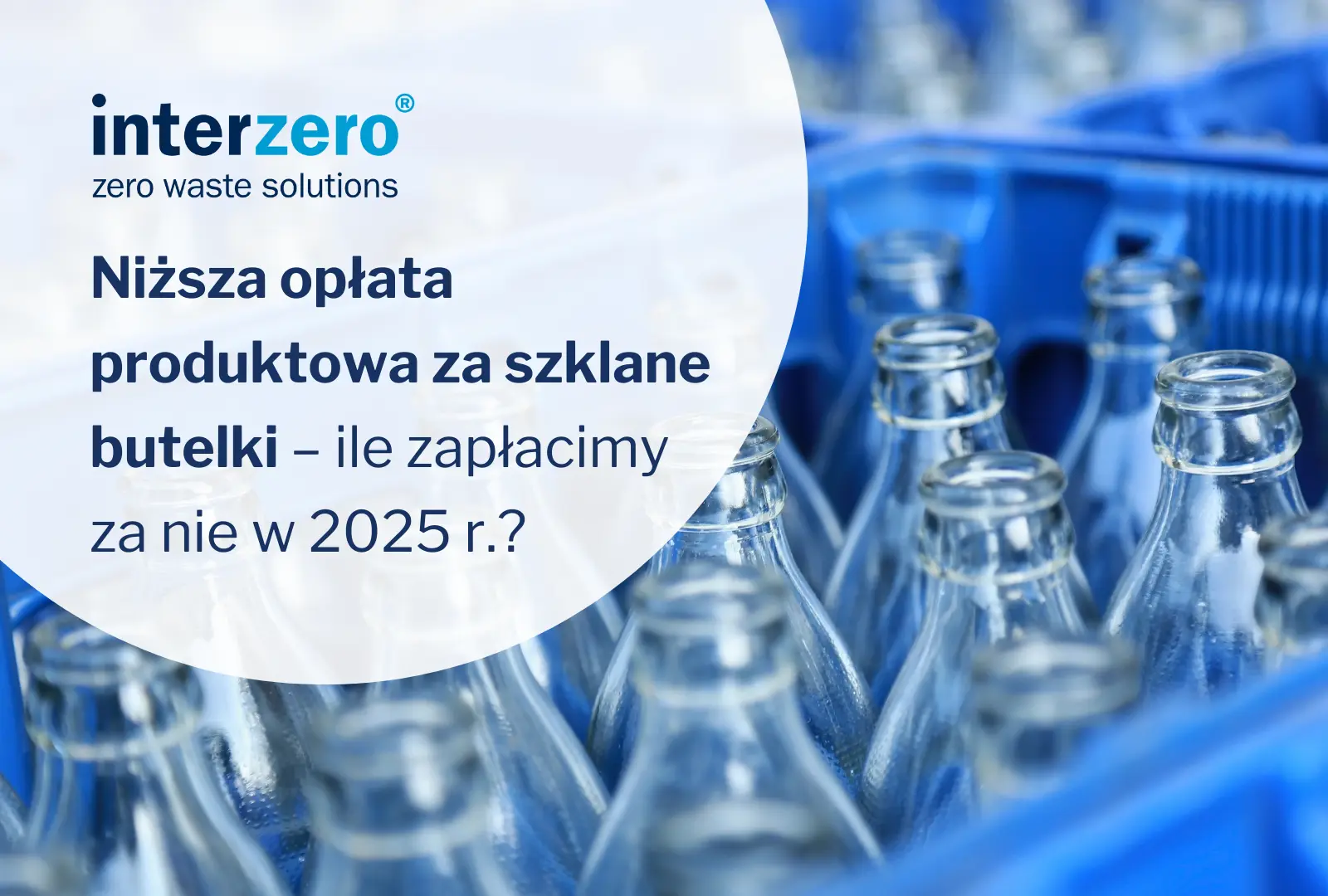
New product fee rates for glass packaging - significant reductions from 2025
Glass bottles collected under the deposit system will be subject to a lower product fee than assumed. The new product fee rates result from the regulation of the Minister of Climate and Environment, which came into force at the beginning of 2025.
Lower product fee for glass bottles covered by the deposit system
On January 1, 2025, an amendment to the regulation of the Minister of Climate and Environment came into force, which significantly reduced the product fee rates for glass packaging collected under the deposit system. According to the new regulations, for each kilogram of reusable glass bottles, those introducing them will pay :
- PLN 0.01 (instead of PLN 0.10) in 2025,
- PLN 0.05 (instead of PLN 1) in 2026,
- PLN 0.25 (instead of PLN 5) in 2027 and subsequent years.
Let us recall that the previous regulations provided for uniform rates for all types of packaging covered by the deposit system. So what is the reason for this change?
Reduction of the product fee due to the higher weight of glass packaging
The amendment to the regulation was intended to make the product fee rates more realistic . As emphasized in the justification for the draft of the new regulation, the weight of a glass bottle is many times higher than the weight of a PET bottle or a can of identical capacity. Based on the data cited by the Ministry of Climate and Environment, the weights of half-liter packages covered by the deposit system are as follows:
- PET bottle - 13 g,
- drinks can - 14 g,
- glass bottle - 315 g.
This means that per 1 kilogram of packaging there are:
- 77 PET bottles,
- 71 cans,
- only 3 glass bottles.
In line with the principle that it is the number of packages that litters, not their weight , the product fee rates for glass packaging have been significantly reduced.
Discover Interzero's comprehensive services for deposit system participants >>
Environmental justification for reducing the product fee for glass packaging
The reduction of the product fee for glass packaging was dictated not only by economic issues, but also by ecological ones. The use of reusable packaging has a positive impact on the environment and brings us closer to the realisation of the idea of circular economy . The use of returnable glass bottles reduces the scale of production of new bottles, and thus reduces carbon dioxide emissions, electricity consumption and raw materials .
Maintaining the current, uniform product fee rates for all these types of packaging could cause those introducing them to abandon their use and replace "expensive" reusable glass with much "cheaper" single-use plastics. Giving up reusable glass bottles would be a step backwards, moving us further away from the transition to a circular economy.
See also:
- 9 months delay in the deposit system. What does this mean for the packaging industry?
- Sielaff Bottle Machines - the best machines for the deposit system
Sources:
- Regulation of the Minister of Climate and Environment of 24 December 2024 amending the regulation on product fee rates for individual types of packaging, https://isap.sejm.gov.pl/isap.nsf/download.xsp/WDU20240001960/O/D20241960.pdf.
- https://legislacja.rcl.gov.pl/projekt/12389300/katalog/13079739#13079739
From 2025 obligation to selectively collect textile waste. Where to throw away old clothes and shoes?

From 2025 obligation to selectively collect textile waste. Where to throw away old clothes and shoes?
From 1 January 2025, textile waste can no longer be disposed of as mixed waste. At the beginning of the year, an amendment to the Act on Maintaining Cleanliness and Order in Municipalities and certain other acts came into force, which obliges all municipalities to conduct selective collection of textile waste.
Selective collection of textile waste on the shoulders of municipalities
According to the provisions of the amendment, from 1 January 2025, each commune is obliged to organise selective collection of textile waste , which includes, among others, used clothing and footwear, home textiles (bedding, curtains) and other fabric products. The minimum that local governments must ensure is the possibility of returning all textile waste to the local PSZOK .
Currently, there are no plans to introduce an additional, sixth container exclusively for textile waste or to oblige municipalities to collect this fraction of waste from properties. However, municipalities have the freedom to organise additional methods of collecting textile waste e.g. collecting it directly from households or creating additional collection points. Częstochowa has recently been testing a similar solution, which allows its residents to return textile waste free of charge after prior telephone appointment.
Textile waste under the EU's microscope
The introduction of the obligation to selectively collect textile waste results from the transposition into Polish law of the provisions of Directive 2008/98/EC of the European Parliament and of the Council of 19 November 2008 on waste and repealing certain Directives. Article 11 paragraph 1 of the Directive obliges all EU Member States to conduct selective collection of at least the following fractions: paper, metal, plastics, glass and textiles. This last fraction is mandatory collected throughout the EU from 1 January 2025.
Let us recall that the European Union is still working on implementing legislation to increase the effectiveness of textile waste collection and impose additional obligations on textile producers, known as the extended producer responsibility system. Under the provisions of the EPR, those introducing textiles are to be charged with the costs related to the collection, segregation and recycling of waste generated from them.
Penalties for incorrect segregation of textile waste
Selective collection of textile waste means new obligations not only for municipalities, but also for their residents. From the new year , it is forbidden to throw textiles into the mixed waste bin . Fines for failure to comply with the new rules or for incorrect waste sorting can range from 200 to 400% of the basic waste collection fee. It should be emphasised that these penalties are not one-off - if residents of the property continue to fail to comply with the statutory obligations, financial penalties may also be charged in the following months.
The mechanism for calculating such punitive fees is already well known to us - similar consequences will also be faced by us for incorrect sorting of other waste fractions for which there is an obligation to selectively collect (glass, metal and plastics, paper, bio-waste). Why are we reminding you of this? Well, the study we conducted in 2023 showed that only 62% of Poles segregate waste into all the required fractions, and even fewer, 43%, declare that they can do it correctly. You will find more conclusions in the report from the research We are getting into trouble .
Where to throw away old clothes and shoes?
Contrary to appearances, since January we are not obliged to return all used textiles to PSZOK. Used textiles in good condition can be donated to charities (e.g. PCK, Caritas, single mothers' homes, homeless shelters) or thrown into a used clothing container .
Textile manufacturers also offer alternative collection points for textiles , giving consumers the opportunity to return old clothes or shoes to their stores. In most cases, these can be products of any brand, which will then be recycled, upcycled or reintroduced to second-hand stores.
As representatives of the waste and recycling industry, we strongly encourage you to act in the spirit of our idea Together for a World Without Waste, which involves not only proper handling of textile waste, but also preventing its generation. How to do it? Discover 5 ways for ecological fashion and a sustainable wardrobe .
Changes in BDO - new regulations for 2025

Changes in BDO - new regulations for 2025
From January 2025, important changes to waste management rules and the functioning of the BDO system will come into force. Their goal is to increase control over waste management, further increase the levels and effectiveness of recycling, and protect the environment. See what will change in BDO in 2025 and check if the new regulations will also apply to your company!
BDO fees up in 2025 - 100% and 166% increase
The change that will affect all entrepreneurs entered in the BDO register is the increase in the annual and registration fee . It is dictated by, among other things, the growing costs of maintaining, running and developing BDO.
From 2025 BDO fee rates will be:
- PLN 200 for micro-entrepreneurs (increase from PLN 100),
- PLN 800 for other entrepreneurs (increase from PLN 300).
Let us remind you that the deadline for paying the annual fee for a given calendar year expires at the end of February - in 2025 it will be February 28. The annual fee must be paid in the new amount by that date.

New regulations for hazardous waste management in 2025
From 2025 an obligation to keep records of all hazardous waste generated by entrepreneurs will be introduced. This means that the previously applicable exemptions will disappear , which were eagerly used by entities generating small amounts of hazardous waste, including beauticians and hairdressers. Entrepreneurs running beauty and hairdressing salons can order registration in BDO Interzero - quickly, conveniently and 100% online.
You can read more about the new obligations of the beauty industry in the article: Beauty and hairdressing salons with the obligation to register with the BDO>>.
The obligation to record will cover hazardous waste with the following codes:
- 3 02 08* Other engine, gear and lubricating oils,
- 15 01 10* Packaging containing residues of or contaminated with hazardous substances,
- ex 15 01 11* Metal packaging containing hazardous porous reinforcements other than those of asbestos, including empty pressure containers,
- 16 02 13* Discarded equipment containing hazardous components other than those mentioned in 16 02 09 to 16 02 12,
- 16 06 03* Batteries containing mercury.
Do you produce such hazardous waste? Check if you need to register your company with BDO in 2025!
Further changes to the obligation to segregate construction and demolition waste in 2025
From January 2025, the obligation to segregate construction and demolition waste into 6 fractions will come into force . The latest change, however, is the departure from the requirement to ensure segregation of R&D waste at the place of its generation - . the entrepreneur will be able to transfer the obligation to segregate it to another entity with appropriate permits and entries in the BDO, provided that an appropriate agreement is signed.
In the previous version of the regulations, the legislator obliged every producer of construction and demolition waste to segregate it at source. As a result of the amendment to the Waste Act, the possibility of segregating waste outside the place of its generation was introduced, but it did not release the entrepreneur from the responsibility for ensuring the implementation of this obligation.
Learn about the new rules for managing construction and demolition waste in 2025.
Postponement of the launch of the confirmation module in BDO
In 2025. it will not be possible to issue DPR and EDPR documents in the BDO system . The introduction of the Confirmation Module, which was to enable the digital generation of these documents, has been postponed until 1 January 2027. From that date, entrepreneurs will be able to electronically issue DPRs and EDPRs for packaging and products, as well as certificates for electrical and electronic equipment and batteries and accumulators.
In 2025-2026, recycling confirmation documents will continue to be issued in paper form .
Increase in financial outlays for BDO in 2025-2034
From 2025, the limits for spending funds from the National Fund for Environmental Protection and Water Management for purposes related to the operation of BDO will be raised . This is to ensure further, trouble-free access to BDO, as well as to maintain the current level of cybersecurity and finance the development of the system.
Moreover, revenues from registration fees and annual fees for entry in the BDO will be a direct income of the National Fund for Environmental Protection and Water Management.
Independent movers did not meet annual packaging waste recycling targets in 2022.

Independent movers did not meet annual packaging waste recycling targets in 2022.
Only 8% of independent introducers achieved the minimum statutory recycling levels in 2022 - according to the IOŚ-PIB report Packaging and packaging waste management in Poland in 2022. In the same period, recovery organisations achieved or even exceeded the annual recycling levels for all types of packaging waste.
Only 8% of independent introducers fulfilled the recycling obligation
Among the introducers who chose to independently ensure the recycling of packaging waste they generated, as many as 11,234 entities were required to achieve the required recycling levels , which in 2022 were:
- 30% for plastic waste,
- 51% for aluminium waste,
- 55% for ferrous metal waste,
- 66% for paper and cardboard waste,
- 62% for glass waste,
- 19% for wood waste,
- 59% for all above types of packaging waste combined.
Based on data from the BDO register, EIA-PIB experts calculated that only 8% of independent introducers achieved the minimum levels mentioned . The percentage of independent introducers who managed to meet the statutory minimum is shown in the graph below:
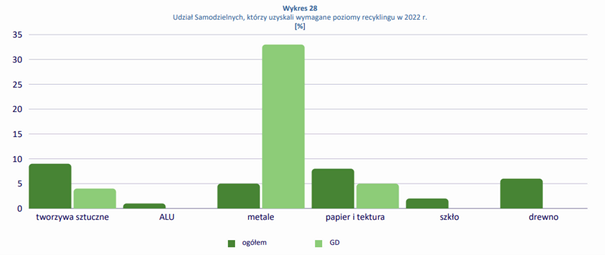
Source: Report on Packaging and Packaging Waste Management in Poland in 2022
At the opposite pole are recovery organisations that in 2022 achieved the statutory recycling levels for packaging waste made of metal, glass, paper and cardboard and exceeded the required recovery level for plastic packaging waste [and] .
Cooperation with a recovery organization is a chance to fulfill the obligation and avoid the product fee
Failure by the entrepreneur to achieve the statutory levels of packaging waste recycling results in the necessity to calculate and pay a product fee, which is a kind of environmental tax. In order to avoid the obligation to pay the fee, the entrepreneur can transfer to the recovery organisation its obligation to recycle packaging waste generated from the packaging and products in packaging introduced by it. Thanks to this, the introducer pays only a fixed, low amount under the contract with the recovery organization and does not have to bother with ensuring waste recycling.
Pass on your recycling responsibility to the Interzero Recovery Organisation
Interzero takes over recycling obligations from entrepreneurs in the scope of:
- packaging waste,
- batteries and accumulators,
- post-consumer products: tires, oils and lubricants,
- electrical and electronic equipment.
Thanks to this, every entrepreneur can comprehensively transfer to us all of their obligations resulting from introducing packaging and products to the market. Check what obligations your company is subject to!
By signing one contract you will gain certainty that your company will meet its obligations to ensure statutory levels of recovery, recycling and preparation for reuse.
[1] Packaging and packaging waste management in Poland in 2022, https://ios.edu.pl/wp-content/uploads/2024/09/gospodarka-opakowaniami-i-odpadami-opakowaniowymi-w-polsce-w-2022-r-2.pdf
Where to return food after the holidays? Christmas zero waste solutions

Where to return food after the holidays? Christmas zero waste solutions
Holidays, holidays and after the holidays, and the fridge is still full? Excess food: bought, prepared and then thrown away is almost a permanent element of every celebration and family gathering. Where to give away food after the holidays so that wasting it does not become a new, not very ecological tradition?
How not to waste food? Learn about food sharing
Every year in Poland, around 4.5 million tons of food is wasted, and 60% of that in households. Why? The most common reasons for throwing away food, as declared by respondents, are:
- expiry date - 60%,
- too much shopping - 26%,
- improper storage - 26%,
- purchase of unpalatable products - 25%,
- purchase of poor quality products - 17%,
- too large portions of meals - 18%,
- lack of ideas on how to use the products - 10% [i] .
The amount of food thrown away increases dramatically during the Christmas and New Year period . It is estimated that 83% of people throw away food during this time. December 24 has even been unofficially declared Christmas Food Waste Day - in Poland alone, as much as 9.2 thousand tons of food end up in the bins. [ii].! Can this be remedied?
For environmental reasons, we encourage moderation above all, which is one of the most important ingredients in our recipe for holiday peace . However, we assume that since you have arrived here, you are struggling with the problem of managing food after the holidays and are looking for a solution that is best for you and nature.
The remedy to most of these problems is food sharing . This movement encourages people to give away excess food to people who will gladly accept it and literally save it from going to waste . There is only one condition - the food must still be edible.
Where to drop off food after the holidays? Map of food pantries in Warsaw and throughout Poland
One way to do holiday food sharing is to use canteens, also known as community fridges. Canteens are publicly accessible fridges, cabinets, and sometimes small rooms that allow for the exchange of food . You can not only leave fresh products or dishes there, but also take what others have left on the shelves.
What should be donated to the soup kitchen? Only food that we would eat ourselves. Importantly, it may be past its expiration date - dry and loose products, preserves, spices, and sometimes even properly stored dairy products are often good for consumption after the date indicated on the packaging. However, when giving food to a canteen, it is worth following a few rules :
- products should be placed in clean packaging and tightly closed,
- Homemade dishes should be labelled with their ingredients and preparation date,
- you can leave previously opened products, but you should indicate the date of opening (especially in the case of food that spoils quickly),
- If a dish requires storage at a low temperature, it should definitely be placed in the fridge!
Contrary to appearances, eateries are not the domain of big cities - you can find them in small towns too!
See the nationwide map of canteens
Go to the map of Warsaw's food places
Don't see your location here? Try searching for it, for example, in an internet search engine - the network of eateries is constantly growing, so there may be locations in your area that have not yet been marked on the map.
List of places where you can donate food after holidays, events and every day
Food drives are not the only places where you can donate food after the holidays (and not only after the holidays). See where else you can share food!
- Food Banks
These are charitable institutions that accept any type of food and then distribute it to those in need. All food products (including perishable products, such as bread, dairy, meat, fruit and vegetables) can be donated to such a bank at least 2 days before their expiration date. There are 31 such banks in Poland. See the map of Food Banks .
- Facebook groups and local forums
Food sharing is also possible through social media and local groups, which you can find under the names:
- online food hall, foodsharing, freeganism,
- I will give it back, watch out, the garbage truck is coming (or simply: the garbage truck),
- we don't waste food.
- Caritas Poland Branches
Caritas has long been actively working to help those in need, while also preventing food waste. Local Caritas branches often accept unnecessary food that has been sitting in the fridge, for example after the holidays or an event. It is worth contacting the nearest Caritas branch and donating food to them, which will then be given to those in need.
- Facilities for people in homelessness crisis
Surplus food from the holidays is also readily accepted by shelters and shelters for people in homelessness crisis. A list of all such facilities, divided by province, can be found on the website of the Ministry of Family, Labor and Social Policy .
And when you do have to throw away... How not to waste food that ends up in the trash?
Sometimes food has to be thrown away - it is spoiled, over-salted, burnt, there may be many reasons. However, it is worth doing it wisely. Properly sorted waste from the table, fridge or kitchen cupboard can still be recycled organically, i.e. composted or fermented.
Where to throw away food? Most food goes into the brown bin for bio-waste . This is where unnecessary, spoiled or expired food should go, but with some exceptions. Leftover meat, cold cuts and bones are mixed waste as are eggs, cheese and other animal products. Mixed dishes containing animal products, such as salads or sauces, are not bio-waste either. Check what we throw away and what we do not throw away into bio-waste .
An alternative to a bio-waste bag is a composter: home, kitchen or electric. It allows you to turn bio-waste into a natural and completely free fertilizer for plants, which can be created in just 24 hours! Such possibilities are provided by the Oklin composter from the Smart line .
[i] Zero recycling point in Poland , https://portalkomunalny.pl/wp-content/uploads/2024/12/raport-punkt-zero-recyklingu-w-polsce.pdf
[ii]. Holidays, holidays and... to the trash. We throw away 1.6 kg of holiday food per person , https://www.rp.pl/przemysl-spozywczy/art41538111-swieta-swieta-i-do-kosza-wyrzutmy-1-6-kg-swiateczny-jeczenia-na-osobe
Construction waste segregation - changes from January 2025

From January, changes in the way construction and demolition waste is segregated
From 2025 segregation of construction and demolition waste at the place of its generation will not be mandatory. The abolition of the obligation to segregate at source (which has not even entered into force yet) is provided for in the draft amendment to the Waste Act, which the Council of Ministers adopted during the session of 29 October 2024.
Abolition of the obligation to separate construction and demolition waste at source
The most important provisions of the amendment are the abolition of the obligation to segregate , i.e. selective collection of construction and demolition waste at the place of its generation, and the definition of responsibility for the segregation of waste fractions.
Every entrepreneur generating construction and demolition waste will be obliged to separate at least 6 fractions at the place of generation:
- wood waste,
- metal waste,
- glass waste,
- plastic waste,
- waste slice,
- mineral waste, including concrete, bricks, tiles, ceramics and stones.
The draft amendment to the Waste Act was created in response to interpretation doubts and potential problems with the organisation and costs of selective collection reported by representatives of the construction industry. The previous version of the regulations, which were to enter into force on January 1, 2025, did not clearly state who is responsible for selective collection and collection of construction and demolition waste. The need to sort them into 6 fractions at the place of generation would also cause a sharp increase in the costs of removing such waste, which in turn could contribute to their illegal storage and disposal directly into the environment .
The waste producer will be able to order segregation
According to the provisions of the act amending the act on waste, an entrepreneur generating construction and demolition waste will be able to transfer it to another authorized entity, which will take over the obligation to separate it into at least 6 fractions outside the place of generation. Importantly, transferring waste to another entity does not completely release the producer of construction and demolition waste from the responsibility for fulfilling the obligation to separate it. If this obligation is not fulfilled due to the fault of the entity that took over the waste, both entities (the producer and the recipient) will be jointly and severally liable for it.
The new regulations are to enter into force on 1 January 2025.
Handling construction and demolition waste according to the hierarchy
In the justification for the draft act, its authors stressed the need for entrepreneurs to comply with the so-called waste management hierarchy:
entities providing services in the field of construction, demolition, renovation of facilities (construction contractors) are obliged to prevent waste generation. [i]
First of all, it is necessary to take action to prevent the generation of construction and demolition waste. Selective waste collection should only take place when the materials are no longer suitable for reuse . The segregation itself is to ensure suitability for preparation for reuse, recycling and other recovery. Regardless of the place of sorting (at the place of generation or outside the place of generation), individual fractions of construction and demolition waste should then be transferred to specialist entities that will take care of their further management. For this purpose, it is often necessary to order professional collection of construction and demolition waste from a specified address offered by, among others, a waste collection company such as Interzero.
[i] https://orka.sejm.gov.pl/Druki10ka.nsf/0/A065E318FFC3BE21C1258BC70041F23F/%24File/766-uzasadzenie.docx
